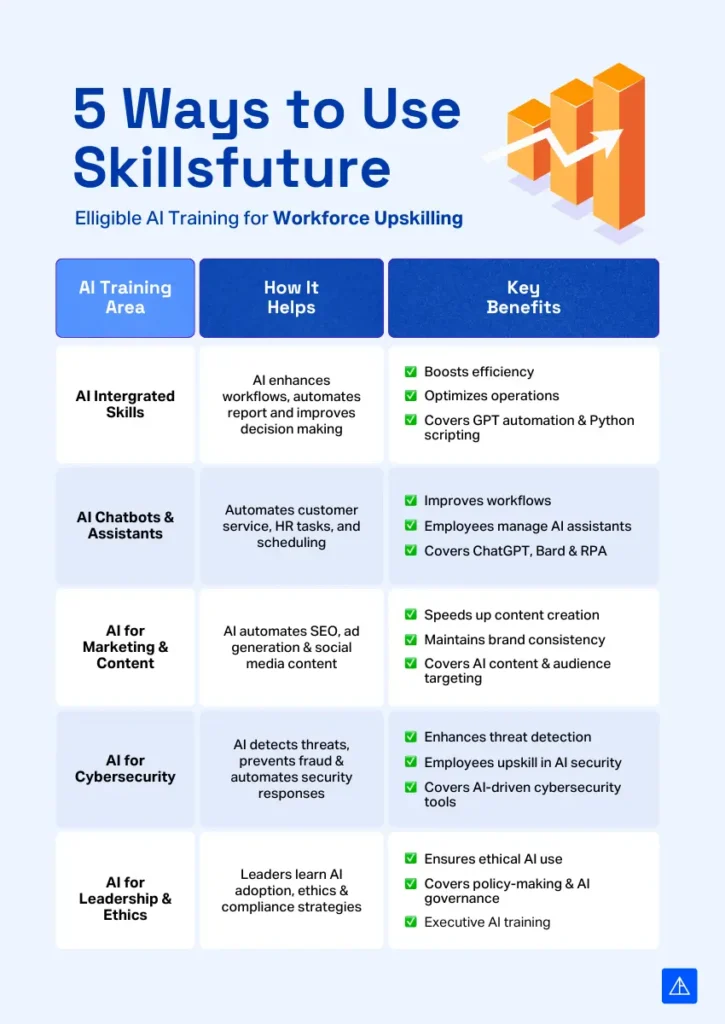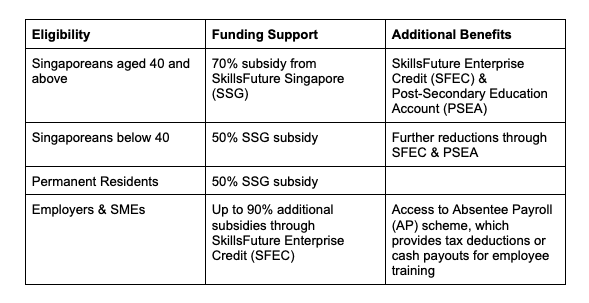As businesses integrate AI-driven technologies into their workflows, employees must develop the right skills to stay relevant and productive. To support this transition, the Singaporean government has introduced several initiatives that make AI training more accessible and affordable for businesses.
Key government support includes:
SkillsFuture Workforce Development Grant
✅ It provides up to 70% funding support for job redesign activities.
✅ It consolidates multiple existing schemes into a simplified application process.
✅ It helps businesses transform operations and enhance workforce capabilities.
Revamped SkillsFuture Enterprise Credit (SFEC)
✅ Companies with at least three resident employees receive a $10,000 credit to support workforce transformation.
✅ The credit functions as an online wallet, allowing businesses to monitor and offset eligible expenses.
✅ It encourages continuous learning and helps employees adapt to AI-driven changes.
📅 Available from the second half of 2026 and will run for three years.
With these subsidies, businesses have a unique opportunity to upskill employees in AI without significant financial burden.
This article explores five ways businesses can use SkillsFuture-eligible AI training to integrate Generative AI into their workforce. By upskilling employees, companies can equip them with practical AI skills that drive business growth.
Related Article: What Employers Need to Know About Absentee Payroll Funding
Is There a Growing Demand for AI Skills in Singapore?
Yes, Singapore has a significant and growing demand for AI skills. As AI adoption accelerates across industries, businesses increasingly seek employees who can implement, manage, and optimise AI-driven solutions.
According to EDB Singapore, the number of AI professionals in the country grew by 565% between 2016 and 2022, surpassing talent growth rates in Australia, India, and Japan. This surge underscores Singapore’s strategic investment in AI adoption across finance, healthcare, logistics, and manufacturing sectors.
The job market shows a strong need for expertise in areas such as:
- Machine Learning
- Python Programming
- Deep Learning
These skills are essential for developing and implementing AI solutions. Meanwhile, new positions are emerging to meet the AI demand, including:
- Algorithm Engineers
- Data Science Specialists
- Machine Learning Engineers
Curious about your AI knowledge? Take the Generative AI Quiz to test your skills and see where you stand! 🚀
GENERATIVE AI QUIZ
Unlock insights into how Generative AI can transform your career.
5 Ways to Use SkillsFuture-Eligible AI Training for Workforce Upskilling
With SkillsFuture-eligible AI training, companies can equip employees with practical AI skills while leveraging government subsidies to offset costs.
Here are five impactful ways businesses can upskill their workforce:
1. Train Employees in AI-Integration Skills
AI is no longer limited to data scientists—it’s becoming an essential tool across multiple business functions. AI integration transforms companies’ operations, from automating reports and analysing trends to optimising workflows and generating insights. Training employees in AI-powered tools and processes helps businesses improve efficiency, make smarter decisions, and stay competitive in an AI-driven economy.
✅ AI enhances data processing, workflow automation, and decision-making.
✅ Employees can leverage AI-driven insights to optimise operations across departments.
✅ SkillsFuture-funded courses train employees in GPT-powered automation, Python scripting, and AI-assisted reporting.
Related Article: How Data Science Transformed a Professional’s Consumer Insights Career & How You Can Too
2. Automate Business Processes with Generative AI Chatbots & Assistants
Automation reduces manual work and increases efficiency. AI-driven chatbots and virtual assistants can now handle customer inquiries, HR processes, scheduling, and more, freeing employees to focus on higher-value tasks. Training employees in AI chatbot integration and management can help businesses improve internal efficiency and customer experience.
✅ AI-driven chatbots improve customer service and internal workflows.
✅ Employees can be trained to integrate, manage, and refine AI-driven assistants.
✅ SkillsFuture-eligible AI training covers tools like ChatGPT, Bard, and AI-powered RPA (Robotic Process Automation).
3. Enhance Digital Marketing & Content Creation with Generative AI
AI-powered content creation is helping businesses scale their campaigns faster and more efficiently. Generative AI tools can automate SEO writing, generate personalised ads, optimise social media posts, and even create video scripts. By upskilling marketing teams in AI-powered tools, businesses can reduce content production time while maintaining brand authenticity and engagement.
✅ Generative AI streamlines copywriting, social media, SEO, and email marketing.
✅ Employees can learn AI tools for automating content while maintaining brand identity.
✅ SkillsFuture-funded AI courses include AI-powered content generation, SEO optimisation, and audience targeting.
Related Article: 6 Best Generative AI Tools for Text Generation to Simplify Your Work
4. Strengthen Cybersecurity with AI-Generated Threat Detection & Response
With cyber threats becoming more sophisticated, businesses must adopt AI-driven security measures. Generative AI can detect anomalies, predict cyberattacks, and automate security responses, helping companies safeguard sensitive data and prevent breaches. Training employees in AI-powered cybersecurity tools enable businesses to manage risks and respond to threats faster and proactively.
✅ AI-powered security models generate predictive threat intelligence reports.
✅ Employees can be trained in Generative AI for cybersecurity, anomaly detection, and fraud prevention.
✅ SkillsFuture-eligible AI programs support upskilling in AI-driven incident response and cybersecurity automation.
5. Develop AI-Literate Leaders for Ethical AI Implementation
Business leaders must understand both the potential and risks of Generative AI. Ethical considerations, compliance, and responsible AI governance are crucial for businesses looking to integrate AI without unintended consequences. Equipping executives and managers with AI literacy ensures that AI adoption is strategic, transparent, and aligned with company values.
✅ Business leaders need to understand the power and risks of Generative AI.
✅ Training programs teach how to implement AI ethically, manage AI adoption, and ensure compliance.
✅ SkillsFuture-eligible AI courses for executives cover AI strategy, policy-making, and responsible AI deployment.

How to Choose the Right AI Training for Your Business Needs
Selecting the appropriate AI training is crucial for aligning your workforce’s skills with your business objectives. Here’s how you can make informed decisions:
1. Define Your Business Goals for AI Adoption
Before selecting an AI training program, businesses must identify their key objectives. A clear understanding of how AI will be integrated into operations ensures that employees gain skills that directly contribute to business growth.
According to HR Executive, a leading publication covering workforce trends and HR technology, companies that align AI training with specific business needs see higher adoption rates and better long-term outcomes.
Here are three key areas businesses should consider when defining their AI adoption goals:
- Automation: Are you aiming to automate repetitive tasks?
- Data Analytics: Do you seek to enhance data-driven decision-making?
- Content Generation: Is improving content creation a priority?
2. Choose Between Short Courses and Long-Term Courses
When selecting an AI training program, businesses need to decide whether a short, skills-focused course or a longer, in-depth program better suits their workforce needs. This decision depends on learning objectives, employee availability, and the level of expertise required.
✅ Short Courses – Best for quick AI skill acquisition in automation, chatbot management, and AI-powered content creation. These courses allow employees to grasp essential AI skills quickly, making them ideal for companies needing immediate AI integration.
✅ Long-Term Courses – Designed for comprehensive AI training covering foundational and advanced AI applications. These courses help businesses develop AI specialists, ensure ethical AI implementation, and support large-scale AI adoption across departments.
🚀 Accelerate workforce upskilling with Vertical Institute’s expert-led Generative AI course— complete it in just 21 hours!
Generative AI Course
Boost efficiency and enhance productivity using Generative AI.
3. Assess the Depth and Specialisation of AI Training
Evaluate the complexity and focus of potential training programs to ensure they meet your team’s proficiency levels and your industry’s demands.
Levels:
- Beginner: Introduces fundamental AI concepts.
- Intermediate: Covers practical applications and tools.
- Advanced: Focuses on specialised, industry-specific AI applications.
Selecting the appropriate level ensures that the training is neither too basic nor too advanced for your employees.
Related Article: Get Certified: 5 Trusted Digital Marketing Certifications in Singapore
4. Ensure Training Covers Ethics, Compliance, and Data Privacy
Incorporate training that addresses ethical considerations, compliance, and data privacy to mitigate risks associated with AI implementation.
Key Topics:
- AI Bias: Understanding and preventing biases in AI systems.
- Data Privacy: Ensuring compliance with data protection regulations.
- Regulatory Compliance: Staying updated with laws governing AI use.
Emphasising these areas fosters responsible AI usage within your organisation.
5. Encourage a Culture of Continuous Learning
Foster an environment that promotes ongoing education to keep pace with technological advancements.
Strategies:
- Provide Access to Resources: Offer materials like webinars and online courses.
- Support Certifications: Encourage employees to pursue relevant certifications.
- Promote Knowledge Sharing: Facilitate internal workshops and discussions.
FAQs About SkillsFuture-Eligible AI TrainingillsFuture-Eligible AI Training
SkillsFuture-eligible AI training refers to AI courses that qualify for government subsidies under Singapore’s SkillsFuture initiative.
Singaporean citizens and permanent residents are eligible for SkillsFuture-funded courses. Companies can also enrol their employees in corporate AI training programs that qualify for SkillsFuture Enterprise Credit and Workforce Development Grants.
Funding for SkillsFuture-eligible AI courses varies based on age, residency status, and employer support. Here’s an overview of the available subsidies:
Yes! Many SkillsFuture AI courses cater to different skill levels. Beginners can start with foundational training before advancing to more specialised topics.
Yes! Vertical Institute offers SkillsFuture-eligible corporate training programs, helping businesses upskill employees while leveraging government subsidies. Book a free call today to learn more about our training programs and available funding options!
Conclusion
According to the World Economic Forum, the rapid advancement of artificial intelligence is reshaping the workforce, requiring employees across industries to develop new skills to stay relevant. As automation and AI-powered tools become more integrated into daily operations, businesses must prioritise upskilling initiatives to ensure their workforce can adapt.
The SkillsFuture initiative plays a crucial role in this transformation, offering subsidies and structured programs to enhance AI proficiency and digital literacy among workers. By investing in AI training, companies not only future-proof their employees but also strengthen their competitive edge in a fast-changing global economy. Leveraging government-backed resources like SkillsFuture allows businesses to seamlessly integrate AI into their workflows, drive innovation, and sustain long-term growth in an increasingly technology-driven world.
About Vertical Institute
Vertical Institute is shaping the future of work by preparing individuals for tomorrow’s job market. Our courses and certification focus on teaching essential skills and nurturing the next generation of innovators and leaders.
As an Approved Training provider (ATO) accredited by SkillsFuture Singapore (SSG) and the Institute of Banking & Finance Singapore (IBF), our courses adhere to the highest standards. They are government-subsidised and eligible for SkillsFuture Credits or NTUC UTAP Funding.




